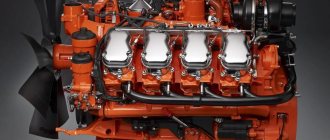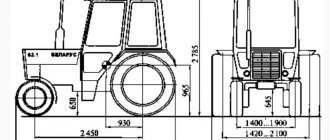As you know, cheaper gas fuel allows you to significantly save money during the operation of various vehicles. To do this, it is enough to install HBO on your car.
In the case of gasoline engines, gas equipment has been used since the days of carburetor engines. Further development of gas injection systems made it possible to install similar solutions on injection engines, both on engines with distributed injection and on engines with direct injection.
As for diesel engines, just a few years ago it was not possible to convert diesel engines to gas, or such work would have been very difficult. However, today the situation has changed radically. Next, we will talk about how to convert a diesel engine to gas, what gas-diesel is, as well as what pros and cons this solution has.
Methane
Methane is a natural gas that is stored in deposits deep within the earth. It is used almost in its pure form, only slightly filtered. Methane has the highest safety among gases, and it is almost completely environmentally friendly. This gas cannot be spoiled or diluted in any way. Its composition always remains the same.
Filling a car with methane is 3 times cheaper than filling a car with gasoline, which is a big advantage of this type of gas. If we consider the environmental friendliness of methane, it has a special standard - Euro 5. This indicates its high environmental friendliness. Methane is considered a modern fuel and is loved by motorists in many European countries, as well as in the USA, because by using it you can reduce the amount of harmful emissions several times.
How does HBO work?
Diesel fuel burns under pressure, but gas does not. The process will proceed as follows:
- The supply of diesel, which is responsible for ignition, is reduced.
- The gas injection process takes place.
Gas injectors will work simultaneously with diesel ones. Their ratio depends on the engine speed. Most often it is 50/50 for propane. If methane, the gas share increases to 70 percent and higher. If you're driving on the highway, gas usage will be highest.
Is it possible to convert diesel to methane?
Previously, installing gas on diesel was very problematic. This is because spark plugs are required to operate a gas car, while in a diesel engine the diesel fuel is ignited without the use of spark plugs.
But recently, this problem has been solved and converting diesel to methane gas has become possible. Today, gas diesel is considered another good alternative for your car.
Installing methane on diesel requires its own special subtleties, but remains quite simple. Converting diesel to gas is suitable for passenger cars, trucks, and agricultural machinery. In general, this combination can be called successful for almost any transport. Replacing a gasoline diesel engine with LPG will take about two days on average, depending on the characteristics and equipment of the vehicle.
DIFFICULTIES WHEN INSTALLING LPG ON A TRACTOR
Using CNG, of course, has its disadvantages. The first is gas storage. For a long-haul tractor or dump truck, it will be necessary to install a cassette of four or five cylinders with a volume of 120 - 150 liters on the frame instead of one of the fuel tanks or vertically behind the cab. This design will weigh 500–700 kg, but will provide a power reserve in gas-diesel mode of up to 800 km. The second is the number of CNG filling stations – methane filling stations. There are not enough of them yet, although new ones are constantly being built and put into operation (there are 4 operating stations in St. Petersburg), so it is necessary to consider routes for gas-diesel vehicles for gas supply.
Pros of converting diesel to methane
- Easy to install. Installing LPG on a diesel engine is suitable for all types of engines, and there is no need to completely modernize the engine of your car.
- Economical. Switching to gas-diesel systems becomes 35% more economical for you than maintaining a car only on diesel fuel.
- Environmentally friendly. Converting diesel to gas, especially methane, increases the environmental friendliness of the engine, thereby reducing exhaust emissions into the atmosphere.
- Reducing the noise level during vehicle operation.
- Increased service life of the diesel fuel supply system.
- Converting diesel to methane increases engine power by up to 30%.
- Increased power reserve. Indeed, in addition to an additional tank with diesel fuel, there is also a gas cylinder. A gas diesel engine can travel three times further without refueling.
Operating principle of a gas-diesel engine
The switch to gas fuel is carried out using a switch from inside the car after warming up the engine, or automatically. The gas supply process is controlled by the electronic control unit of the gas treatment unit. Gas is supplied to the diesel engine in doses using injectors into the intake manifold. From where it mixes with air, on the intake stroke, it enters the cylinders through the intake valves. Then diesel fuel is sprayed into the gas-air mixture compressed by the piston (compression stroke), where an explosion occurs due to pressure and temperature. D/t here acts as a fuse, since the ignition temperature of the gas is higher than diesel fuel and it itself cannot ignite.
Is it profitable to put methane on diesel?
The price of HBO is higher than the price of a gasoline system for diesel. But at the same time, methane itself is much cheaper than gasoline fuel. What will help you save in the future and become a plus. Installing LPG on a diesel engine is, in general, a very profitable investment. Since, in addition to environmental friendliness and economy, it will significantly improve the performance of the car, increase the service life of the engine and its power. And installing gas equipment on diesel will pay for itself in approximately 4 months, depending on your fuel consumption.
Possibility of DIY installation
Many people ask questions about whether it is possible to independently supply gas to a diesel engine and switch the engine to an alternative fuel without outside intervention. In theory it is possible, but in practice everything is much more complicated.
If you ask whether it is actually possible to install LPG on a diesel engine, all experts will definitely answer in the affirmative. Such a transition is possible. The only problem is that it is impossible to do this yourself without special equipment and tools.
You can find out from the owners of gas-diesel cars themselves whether they put gas in a regular diesel engine in a garage. There are craftsmen who assemble the knot themselves. The biggest difficulties are usually associated with:
- connecting gas equipment;
- adaptation and synchronization of the standard fuel system;
- installation of electronics;
- installation of control and measuring instruments.
Yes, in theory, you can install gas in a diesel car yourself, but you will additionally have to find the appropriate software.
But there are several pitfalls in this situation. It was not for nothing that it was noted that it is possible to supply gas if you have a diesel engine, rather in theory, with your own hands. Whether this is true in practice is an extremely pressing question. The problem of self-installation is supported by the following nuances:
- Technically, it is very difficult to implement such a project on your own. You need equipment, tools, special software. This stops about 80% of attempts to do everything yourself.
- When switching to an alternative type of fuel, special documentary evidence is required that the work was performed by a licensed specialized service.
- Without such confirmation, another difficulty arises. This is registration of the alteration with the traffic police. And the absence of notes about changes is punishable by a fine.
In the absence of permission, the car owner will not only be fined, but also forced to dismantle the LPG.
This largely answers the question of whether LPG systems are installed on diesel monofuel engines and why it is better to entrust such work to specialists of the appropriate profile.
HBO equipment
It has few differences when compared with gas equipment for gasoline engines. But on diesel engines it becomes possible to control the supply of diesel fuel using a special device.
For cars with different fuel supply systems, electronic activators or software units that control the system are suitable.
They allow you to shut off or open the gas system if necessary. Their advantages:
- Security system monitoring.
- Possibility of opening the gas supply if it runs out.
- The ability to force the car to use diesel by pressing just one button.
Advantages and disadvantages
The main advantage of methane or propane on diesel is reduced fuel costs. Savings can range from 10% to 25%. Maximum efficiency is felt when driving at medium speeds on country roads.
Truck with installed composite gas cylinders
Among the disadvantages are the long payback period for urban use or low mileage, the cost of re-equipment, as well as the presence of additional components that may fail.
Savings in everything
In relation to gasoline, the consumption coefficient of the propane-butane mixture is approximately 1.15 - 1.20, while for methane it is equal to 1, i.e. the consumption is the same. At the same time, the price of 1 cubic. m of methane turns out to be approximately 2.5 times lower than the cost of the equivalent 1 liter of AI-95 gasoline.
In addition to direct savings on fuel costs, an important point when using methane is savings on consumables and vehicle maintenance. Among all other types of hydrocarbon fuels (propane-butane, gasoline, diesel fuel), natural gas methane turns out to be the most “friendly” in relation to the engine. The octane number of methane is 120, which is higher than that of any gasoline, due to which natural gas burns evenly and without detonation. Carbon formation in the engine when using methane is also minimal, since, unlike all other types of fuel, natural gas does not have any foreign chemical impurities.
All the advantages of methane are especially evident when operating a car in the urban cycle, with frequent changes in “small-medium” loads, which is precisely what is most “harmful” for the engine. Here, the use of methane allows you to maximize (up to 4 times compared to gasoline) the service life of such an expensive part as a catalytic converter (plus oxygen sensors), and 2-3 times the service life of such typical “consumables” as spark plugs.
Safety and ecology
In terms of explosion and fire safety, methane is superior to all types of fuel, being much safer than diesel, gasoline (!!) and even more than propane-butane. Unlike gasoline, methane cannot spill and, evaporating, create explosive vapors (which can also happen if heavy propane-butane leaks). Modern methane gas equipment has a reliable protection system that blocks gas leaks. Moreover, the cylinder itself has a wall thickness designed to withstand a pressure of 200 kgf/cm2, which will prevent an explosion from occurring even in the event of a serious accident. In terms of environmental safety, a methane-powered car is second only to an electric car. Due to its purity and completeness of combustion, natural gas protects not only engines, but also the environment! This is something that we, conscious citizens, should not forget about either.
Feasibility of installation
As we know, diesel units are already quite economical, is it worth paying 80,000 to install Dual Fuel? What's the benefit?
There is a benefit, but not as big as with the gasoline option.
Let’s say that our diesel consumption is 10 liters per 100 km, if we take average prices it is 35 rubles per liter, that is, 350 rubles per 100 km, without gas.
Our gas cost is 16 rubles (we take propane), it will replace about 50% of liquid fuel. That is, it turns out (16 X 5 = 80 rubles) and (35 X 5 = 175 rubles) = 255 rubles, the difference is 95 rubles from 100 km, from 1000 - 950 rubles.
Of course, if you move around a lot, then of course it makes sense! However, for a private passenger car with a mileage of 1000 - 1500 km per month, the payback of the equipment will occur in 60 - 70 months, here, in my opinion, you need to think very hard.
Now we are watching the video version.
I’ll end here, I think my article was useful to you, sincerely your AUTOBLOGGER.
(
11 votes, average: 4.55 out of 5)
Similar news
Gas for cars: pros and cons. Let's look at propane and methane + video
Removes moisture (water) from the gas tank. With your own hands
Which gasoline burns faster, longer and better? 92 – 95 – 98 or 100.











